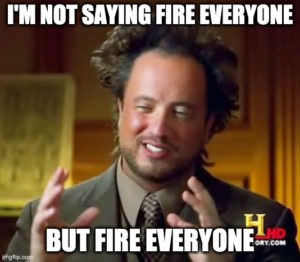If you’ve been reading this blog long enough, one recurring theme is that Nobel-prize winning leftwing economist and pundit Paul Krugman is always wrong. Back in the day, Larry Kudlow made a career pointing out Krugman’s errors, and you may remember such Krugman howlers as “the Internet is no more important than a fax machine” and “markets will never recover from Trump.”
Lately he’s been in the news for dismissing the idea that inflation is a problem.
Paul Krugman, May 7: “[Treasury secretary] Janet Yellen and I believe that the Fed can contain any inflationary risks.”
Paul Krugman, June 21: “For those paying closer attention to the flow of new information, inflation panic is, you know, so last week.”
Paul Krugman, July 23: “Overheating is still possible, and the Fed should keep its eye on that possibility. But the big numbers aren’t as scary as they seem.”
Paul Krugman, August 12: “Anxiety about the inflationary impact of public investment just doesn’t make sense if you work through the numbers.”
Paul Krugman, September 10: “Companies aren’t acting as if they expect lots of future inflation, where they can hike wages without losing competitive advantage. They’re acting, instead, as if they see current inflation as a blip.”
Paul Krugman, November 11: “So yes, that was an ugly inflation report, and we hope that future reports will look better. But people making knee-jerk comparisons with the 1970s and screaming about stagflation are looking at the wrong history. When you look at the right history, it tells you not to panic.”
The New York Times, this morning:
Inflation jumped to the highest level in nearly 40 years, fresh data released on Friday showed, as supply chain disruptions, rapid consumer demand and rising housing costs combined to fuel the strongest inflationary burst in a generation (emphasis added).
The rising costs spell trouble for officials at the Federal Reserve and the White House, who are trying to calibrate policy at a moment when the labor market has yet to completely heal from the pandemic, but the risk that price increases could become more lasting is increasing.
The Consumer Price Index climbed by 6.8 percent in the year through November, the data showed, the fastest pace since 1982.
One of the reasons inflation is such a serious problem right now is that we have an administration, a Fed, and a lot of ideologically or politically aligned economic elites who are wedded to the belief that inflation is not a serious problem.
Proving that some of the most basic facts of economic life for ordinary people elude some Nobel-prize winning economists, Krugman dismisses the idea that inflation hurts the poor worse than the rich.
Inflation redistributes from creditors to debtors — not exactly a burden on the bottom half of the income distribution 2/
— Paul Krugman (@paulkrugman) December 11, 2021
"Inflation especially hurts the poor" has truthiness — it sounds like it should be true. But I don't see either evidence or a mechanism 4/
— Paul Krugman (@paulkrugman) December 11, 2021
Hey, Mr. Super-Genius: A family of four just getting by on $1,500 is hurt a lot more when the price of milk rises by 80 cents a gallon and gasoline rises a dollar a gallon.
Here Louis Rossmann (who does something like two videos a day) expounds upon that theme:
Some of his complaints are more acute for New York City than the rest of the country, but he’s far more in touch with reality than Krugman seems to be.
So what does the Biden Administration plan to do about inflation? Easy. They’re going to redefine it away by removing commodity prices from the CPI.
Yes, I’m sure that will fool people…


